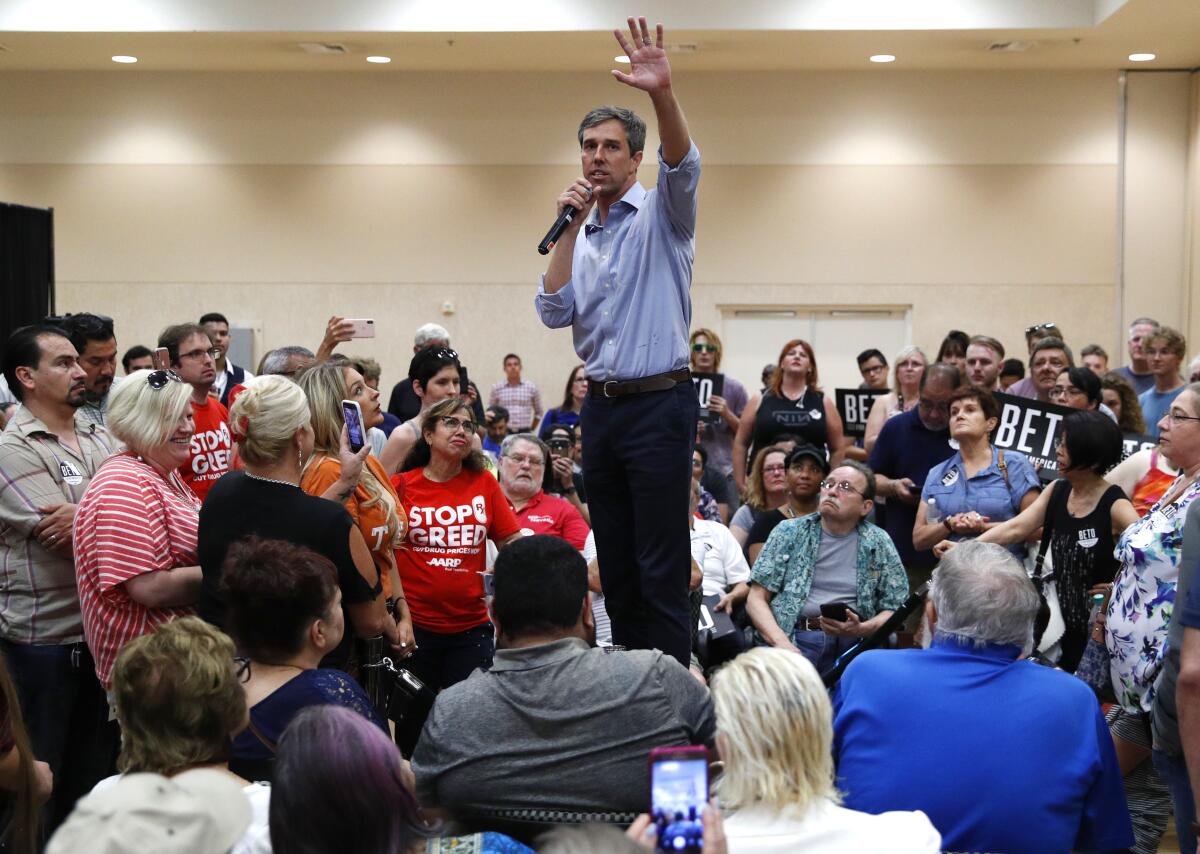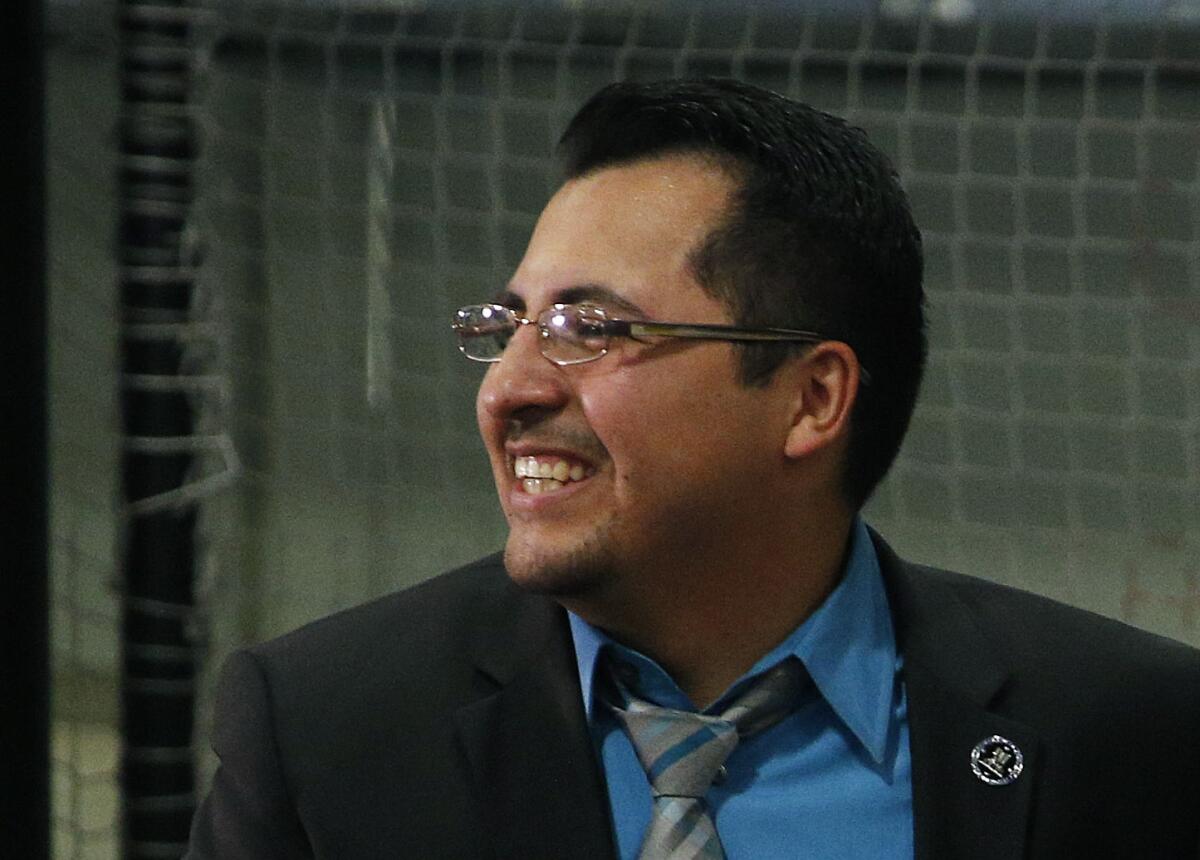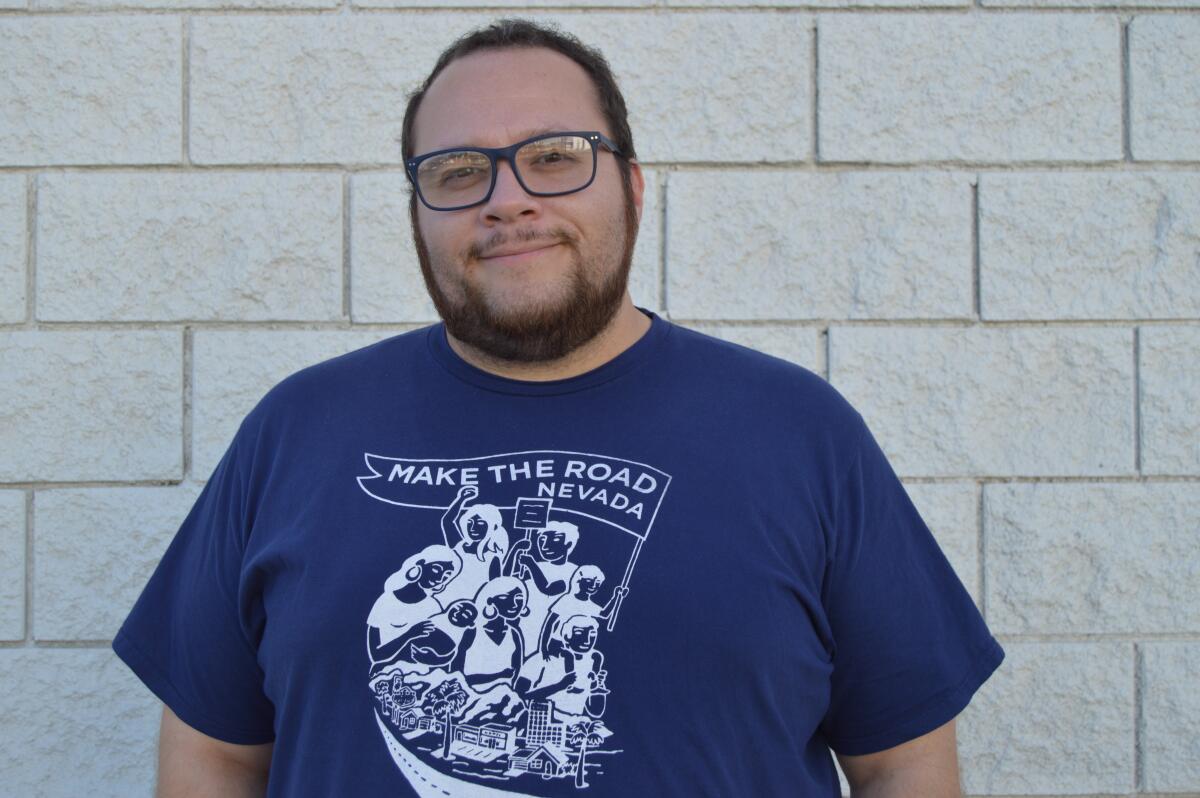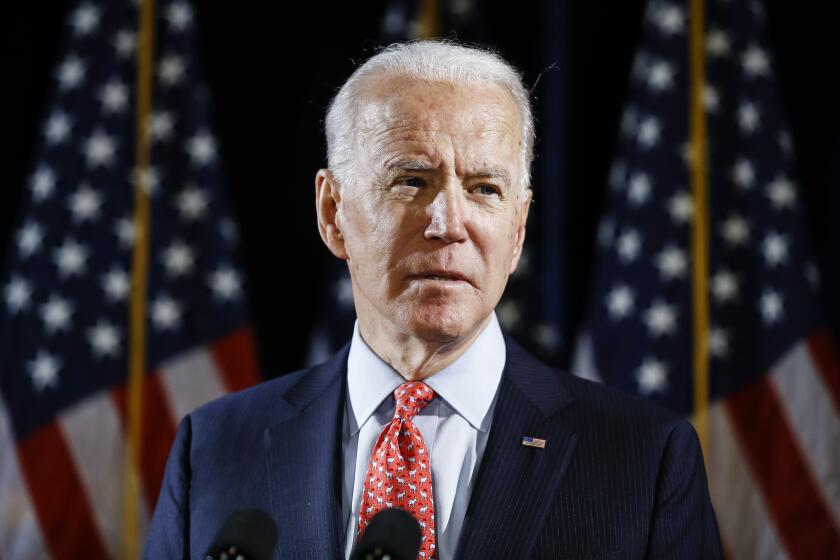‘Just saying hola isn’t enough.’ How do Latino voters feel when candidates speak Spanish?

- Share via
LAS VEGAS — Beto O’Rourke stepped up on a red cooler so the crowd packed inside Taqueria Arandas could see him.
“Primero, buenos días,” he began, greeting people. He thanked the family that owns the restaurant and launched his pitch: “Necesitamos un país en que cualquier persona [pueda] participar con su voz y su voto en su democracía.” “We need a country where anybody can participate in their democracy with their voice and their vote.”
The audience cheered, clapped and leaned in close to listen to the former Texas congressman, one of several 2020 Democratic candidates speaking at least some Spanish on the campaign trail.
South Bend, Ind., Mayor Pete Buttigieg, who knows seven languages to varying degrees, has spoken Spanish at his events, as has Sen. Cory Booker of New Jersey. Former Housing Secretary Julián Castro uses Spanish for emphasis, for example ending a message to the president with “Ya basta” — “Enough.”
But does a candidate speaking Spanish make a difference to voters who know the language? The answer can be as nuanced as the Latino electorate, which is often mischaracterized as a monolithic voting bloc.
“There’s nothing more powerful than somebody saying, ‘I’m fighting for you,’ without the use of a translator,” said Edgar Flores, a state assemblyman whose east Las Vegas district is nearly 70% Latino.

Flores, who is bilingual, hosts events for constituents in Spanish and English, and believes using the second-most spoken language in the U.S. is extremely effective in reaching voters, especially in Nevada, one of the country’s most diverse states.
But that does not translate as the sole means to winning the Latino vote, he and others caution.
“When you come to the community, just saying ‘hola’ isn’t enough,” Flores said. “They need to know what issues you stand for.”
The role of Spanish in this year’s election cycle is likely to bubble up again during the Democratic primary debate in Houston on Thursday, which will be co-hosted by Spanish-language network Univision and simulcast with live translation.
At a debate co-hosted by Telemundo in June, O’Rourke, Castro and Booker spoke a bit of Spanish, at times with wavering pronunciations and grammar, leading some critics to accuse them of “Hispandering.”
Andy Hernandez, who led Latino outreach during President Clinton’s 1996 reelection campaign, disagreed. When people discount Spanish in English settings, they’re saying the Latino vote is less important, he said.
“It’s no different than going to an Iowa State Fair and eating a corn dog,” he said. “Is that pandering? I don’t consider it pandering. Now, are they going to win the Latino vote just on that? Of course not.”
The field is down to Joe Biden now that Bernie Sanders ended his presidential campaign. Here is the Democrat heading for a battle with President Trump.
Latino voters could be a major force in 2020, when they are expected to surpass African Americans to become the largest minority voting bloc, according to the Pew Research Center; an estimated 32 million Hispanic voters, a Pew category that includes Latinos and some non-Latinos, will account for more than 13% of all Americans eligible to cast a ballot.
In Clark County, home to Las Vegas and about two-thirds of Nevada’s population, nearly 1 in 4 people speak Spanish at home. Nevada falls third on the 2020 primary calendar, after Iowa and New Hampshire, which are both overwhelmingly white.
“If you’re a campaign and the first Latino test you have is Nevada … then it makes sense to want to reach a Spanish-speaking population because it’s still a dominant portion of the electorate,” said Andres Ramirez, a Las Vegas-based political consultant.
Maria Luisa Escobar, a housekeeper at the Venetian hotel on the Las Vegas Strip, said she respects politicians who speak her first language.
“I like that they are open to other cultures,” the 51-year-old said in Spanish, which she and her co-workers mostly speak at work. Many of them are citizens, she said, but are hesitant to participate in English-dominant settings.
“When it comes time to vote, there are times when they feel like they can’t, because they don’t understand,” Escobar said, “so it’s important that the information is in Spanish.”
A candidate’s language ability, however, isn’t as important to Latino voters as their stances on issues, polls have shown. Latino voters rated the ability to speak Spanish ninth — last — in what they were looking for, a June UnidosUS poll found. Most said they wanted a candidate who values diversity and brings people together. A Univision poll after the June debate found 53% of respondents said a candidate speaking Spanish was a motivation to vote for them; 35% said it didn’t matter.
For Las Vegas resident Wendy Losada, hearing Spanish at the debate was a sign of acknowledgment. “I was very excited that he did that,” she said of O’Rourke, the first to answer a question in Spanish. “I was like, ‘Thank you, thank you, thank you very much,’” said Losada, 50.
Hector Fong Jr.’s first thought when candidates speak Spanish is that they’re pandering. But the 21-year-old said older Spanish speakers like his relatives would benefit from events in their first language, a thought shared by many of the dozen bilingual voters The Times interviewed in Las Vegas. Older Spanish speakers are less likely to say they understand English “very well” than younger generations, according to the Census Bureau.
“I have tías” — aunts — “...who want to get active,” said Fong, a political science student. “They want to be active in the community; they don’t want to just vote or not vote. They care.”
Some of the Nevadans interviewed said holding an event in Spanish, especially when Latinos face attacks for speaking the language in public settings, would send a powerful message. Even offering translations could be seen as a rejection of the racist rhetoric that speaking Spanish is unAmerican, they suggested.
At a town hall in Nevada in March, California Sen. Kamala Harris’ campaign offered headsets for real-time translations in Spanish. Massachusetts Sen. Elizabeth Warren brought a translator for a roundtable event hosted by a Nevada immigration advocacy group.

“It was really refreshing,” said Leo Murrieta, director of Make the Road Nevada. Murrieta, whose immigrant advocacy group holds its meetings in Spanish with English translation, said he appreciates candidates who learn the language.
But “if you can’t tell me in Spanish what you’re going to do to lower drug prices for my parents, let’s just stick to English and let the translators do what they do,” he said.
The most fluent of the candidates and least likely to use a translator appears to be O’Rourke, who grew up learning Spanish in the border town of El Paso and was given the Spanish nickname “Beto” as a child. As a city councilman in his hometown, O’Rourke hosted town halls in Spanish and English for the largely bilingual community, his campaign said. It is not uncommon for O’Rourke, who is Irish American, to pepper Spanish words into speeches wherever he goes on the campaign trail, including at a house party in front of a mostly white crowd in New Hampshire.
Castro, the only Latino vying for the Democratic nomination, does not speak Spanish fluently, but he has focused part of his campaign on Latinos. His first campaign stop was in Puerto Rico, a bilingual U.S. territory, and he was the first to release a comprehensive immigration plan. In talking about his plan, he often speaks about his grandmother, who came to the U.S. from Mexico at age 7.
Castro has spoken about how Latinos who have lived in this country for decades were punished or looked down on for speaking Spanish. “In my family, like a lot of other families, the residue of that, the impact of that, is that there are many folks whose Spanish is not that great,” he said.
Castro’s story is one that 20-year-old Alma Romo can relate to.
On a Sunday afternoon, the college freshman sat with her parents at the Las Vegas office of Mi Familia Vota, where she works as an organizer, and spoke about struggling to speak Spanish. Like Castro’s, her grammar is imperfect, and she ducks into a room when she is speaking Spanish on the phone to avoid being overheard.
So for her, Castro’s lack of fluency isn’t an issue. She appreciates his record of supporting Latinos and his plan for immigration reform, she said.
“Sometimes I feel like the work that you put in is 10 times more important than just being able to speak Spanish,” Romo said.
Teresa Parraga agrees.
The housekeeper at the Paris Las Vegas hotel said she has struggled to retain her English after becoming a naturalized citizen in 1998; she understands the language well but gets by just fine speaking Spanish. Referencing a common Mexican saying, Parraga, 66, said she thinks candidates often “dorar la píldora,” or sweeten the pill, when they speak bits of Spanish.
“If you’re speaking my language and you’re expressing to me in my language what your plans are for issues I care about, perfect, I’ll understand you better,” she said in Spanish. “But if you are utilizing my language to sweeten the pill, no. I’ll go with English.”
More to Read
Get the L.A. Times Politics newsletter
Deeply reported insights into legislation, politics and policy from Sacramento, Washington and beyond. In your inbox twice per week.
You may occasionally receive promotional content from the Los Angeles Times.










